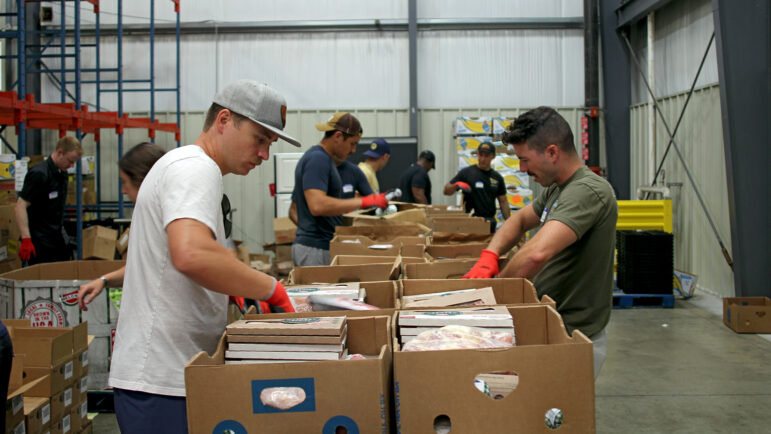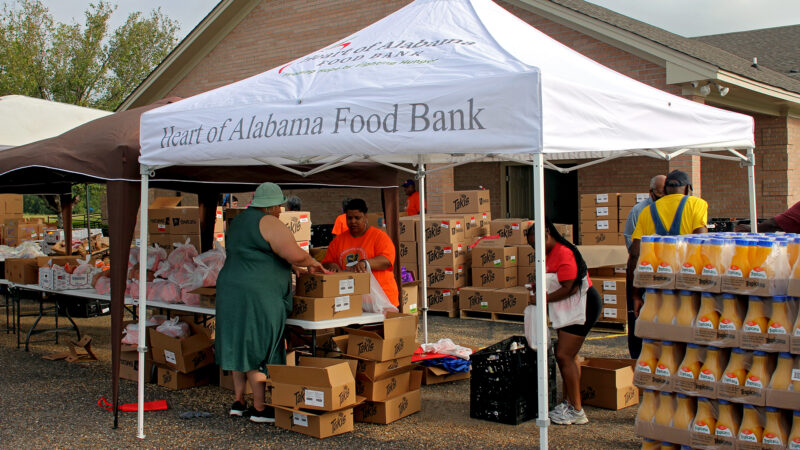How Alabama food banks are keeping rural communities fed
Volunteers help patrons of Shiloh Primitive Baptist Church’s mobile food pantry in Lowndesboro, Alabama, on Aug 22. 2024. Although Shiloh isn’t in District 2, the county deals with similar issues, like poverty, as other communities in South Central Alabama.
Nearly 20 cars line the street outside of Shiloh Primitive Baptist Church in Lowndesboro, Alabama, in late August. Volunteers have placed laminated numbers onto their dashboards to count how many families will be served when the cars start their journey through the line.
It’s the first time this church has done a mobile food pantry, coordinated by the Alabama Office of Minority Affairs and Heart of Alabama Food Bank. An 18-wheeler has unloaded dozens of pallets of boxed foods — fresh lettuce and apples, potato chips, orange juice and more.
Residents like Viola Loving call it a blessing.
“They’re a godsend for people that don’t have anything,” Loving said.
Loving is homeless and has been living in her truck for almost a year now. She’s on social security income, which she said isn’t enough to cover living expenses — such as rent and food. A few weeks before coming to the mobile pantry, she spent $800 on maintenance work for her car. It wasn’t enough to fix it, but enough to keep her moving.

“I couldn’t afford it,” she said. “It’s another $400. I couldn’t do it. That’s a bite.”
Loving came to Shiloh to pick up boxes of shelf-stable food to keep in her car while she tries to manage her health and find an affordable place to live. She said that sometimes she relies on the kindness of restaurants to stay fed — sometimes receiving a sandwich, or fries and a drink.
“Most of the time, they say ‘We can’t do that. We can’t afford to give you anything. That comes out of our pockets,’” she said.
Amy Dennis, community engagement coordinator for Heart of Alabama Food Bank, said their mission is to keep as many families fed as possible. Between partner pantries and affiliates, Heart of Alabama Food Bank covers 35 counties, distributing about 30 million pounds of food each year to South Central Alabama. The organization holds mobile food pantries across the region nearly every day of the week, with dozens of volunteers and staff at the warehouse also packaging food for school backpack programs, senior citizens and veterans.
“Sometimes ends just don’t meet, even for people that have worked very hard,” Dennis said. “Food banks and the programs that we operate like this one support people that have fallen in between.”

Food insecurity affects nearly 1 in 5 adults, and 1 in 4 children in Alabama, according to the Alabama Department of Public Health. It’s a demand that can wear on some smaller pantries, especially as they seek more funding to survive. Dennis said local pantries have volunteers who are eager to help, but the food bank can buy more items at lower prices.
“At the end of the day, sometimes those dollars make the biggest difference,” she said. “[Partner pantries] tell us time and time again, ‘The reason we’re not serving more people is because we don’t have the money to purchase more food.”
But it’s not just a matter of getting the food to families. It’s getting families to where they can receive help. Carol Gundlach, a senior policy analyst with Alabama Arise, said having reliable transportation is key in steadily growing food deserts.
“There are very few grocery stores,” Gundlach said. “If you don’t have transportation, it’s very difficult to get to a grocery store, to get to Montgomery, to get to Opelika, to get to wherever there are big grocery stores or Walmarts.”
Issues of poverty often pile up, Gundlach said, and families can quickly find themselves deciding which living expense to prioritize. Recently, Pandemic SNAP benefits ended, meaning families lost extra supplemental funds for groceries, which sometimes put them in more difficult positions than before.
“There’s a whole food inflation going on at the same time that SNAP benefits have declined,” she said, which could lead to an increase of residents needing more resources — making it difficult for rural pantries to keep up.
“What demand there is, gets dumped more and more on the private nonprofit sector like the little food pantries that are run by churches,” she said. “It’s a valiant effort, but they cannot meet the need.”
Gundlach said federal funding could greatly improve poverty in South Alabama. With the November elections drawing close, residents in District 2 — where congressional lines were redrawn last year — have a big decision to make.
“I hope that District 2 makes a good decision when they vote because we really desperately need resources,” Gundlach said. “Not just here, but all across the Black Belt.”
This story was produced by the Gulf States Newsroom, a collaboration between Mississippi Public Broadcasting, WBHM in Alabama, WWNO and WRKF in Louisiana and NPR.
Trump warns Iran not to retaliate after Ayatollah Ali Khamenei is killed
The Iranian government has announced 40 days of mourning. The country's supreme leader was killed following an attack launched by the U.S. and Israel on Saturday against Iran.
Iran fires missiles at Israel and Gulf states after U.S.-Israeli strike kills Khamenei
Iran fired missiles at targets in Israel and Gulf Arab states Sunday after vowing massive retaliation for the killing of Supreme Leader Ayatollah Ali Khamenei by the United States and Israel.
House Dem. Leader Jeffries responds to air strikes on Iran by U.S. and Israel
NPR's Emily Kwong speaks to House Minority Leader Hakeem Jeffries (D-NY), who is still calling for a vote on a war powers resolution following a wave of U.S.- and Israel-led airstrikes on Iran.
Iran’s Ayatollah Ali Khamenei is killed in Israeli strike, ending 36-year iron rule
Khamenei, the Islamic Republic's second supreme leader, has been killed. He had held power since 1989, guiding Iran through difficult times — and overseeing the violent suppression of dissent.
Found: The 19th century silent film that first captured a robot attack
A newly rediscovered 1897 short by famed French filmmaker Georges Méliès is being hailed as the first-ever depiction of a robot in cinema.
‘One year of failure.’ The Lancet slams RFK Jr.’s first year as health chief
In a scathing review, the top US medical journal's editorial board warned that the "destruction that Kennedy has wrought in 1 in office might take generations to repair."





